 Lihat di TensorFlow.org Lihat di TensorFlow.org |  Jalankan di Google Colab Jalankan di Google Colab |  Lihat di GitHub Lihat di GitHub |  Unduh buku catatan Unduh buku catatan |  Lihat model TF Hub Lihat model TF Hub |
Colab ini akan menunjukkan cara menggunakan model SPICE yang diunduh dari TensorFlow Hub.
sudo apt-get install -q -y timidity libsndfile1
Reading package lists... Building dependency tree... Reading state information... The following packages were automatically installed and are no longer required: linux-gcp-5.4-headers-5.4.0-1040 linux-gcp-5.4-headers-5.4.0-1043 linux-gcp-5.4-headers-5.4.0-1044 linux-gcp-5.4-headers-5.4.0-1049 linux-headers-5.4.0-1049-gcp linux-image-5.4.0-1049-gcp linux-modules-5.4.0-1049-gcp linux-modules-extra-5.4.0-1049-gcp Use 'sudo apt autoremove' to remove them. The following additional packages will be installed: freepats libaudio2 libflac8 libjack-jackd2-0 libogg0 libsamplerate0 libvorbis0a libvorbisenc2 timidity-daemon Suggested packages: nas jackd2 fluid-soundfont-gm fluid-soundfont-gs pmidi The following NEW packages will be installed: freepats libaudio2 libflac8 libjack-jackd2-0 libogg0 libsamplerate0 libsndfile1 libvorbis0a libvorbisenc2 timidity timidity-daemon 0 upgraded, 11 newly installed, 0 to remove and 143 not upgraded. Need to get 31.4 MB of archives. After this operation, 40.4 MB of additional disk space will be used. Get:1 http://asia-east1.gce.archive.ubuntu.com/ubuntu bionic/main amd64 libogg0 amd64 1.3.2-1 [17.2 kB] Get:2 http://asia-east1.gce.archive.ubuntu.com/ubuntu bionic/universe amd64 freepats all 20060219-1 [29.0 MB] Get:3 http://asia-east1.gce.archive.ubuntu.com/ubuntu bionic/main amd64 libaudio2 amd64 1.9.4-6 [50.3 kB] Get:4 http://asia-east1.gce.archive.ubuntu.com/ubuntu bionic/main amd64 libflac8 amd64 1.3.2-1 [213 kB] Get:5 http://asia-east1.gce.archive.ubuntu.com/ubuntu bionic/main amd64 libsamplerate0 amd64 0.1.9-1 [938 kB] Get:6 http://asia-east1.gce.archive.ubuntu.com/ubuntu bionic/main amd64 libjack-jackd2-0 amd64 1.9.12~dfsg-2 [263 kB] Get:7 http://asia-east1.gce.archive.ubuntu.com/ubuntu bionic/main amd64 libvorbis0a amd64 1.3.5-4.2 [86.4 kB] Get:8 http://asia-east1.gce.archive.ubuntu.com/ubuntu bionic/main amd64 libvorbisenc2 amd64 1.3.5-4.2 [70.7 kB] Get:9 http://asia-east1.gce.archive.ubuntu.com/ubuntu bionic-updates/main amd64 libsndfile1 amd64 1.0.28-4ubuntu0.18.04.2 [170 kB] Get:10 http://asia-east1.gce.archive.ubuntu.com/ubuntu bionic/universe amd64 timidity amd64 2.13.2-41 [585 kB] Get:11 http://asia-east1.gce.archive.ubuntu.com/ubuntu bionic/universe amd64 timidity-daemon all 2.13.2-41 [5984 B] Fetched 31.4 MB in 2s (14.5 MB/s) Selecting previously unselected package libogg0:amd64. (Reading database ... 281949 files and directories currently installed.) Preparing to unpack .../00-libogg0_1.3.2-1_amd64.deb ... Unpacking libogg0:amd64 (1.3.2-1) ... Selecting previously unselected package freepats. Preparing to unpack .../01-freepats_20060219-1_all.deb ... Unpacking freepats (20060219-1) ... Selecting previously unselected package libaudio2:amd64. Preparing to unpack .../02-libaudio2_1.9.4-6_amd64.deb ... Unpacking libaudio2:amd64 (1.9.4-6) ... Selecting previously unselected package libflac8:amd64. Preparing to unpack .../03-libflac8_1.3.2-1_amd64.deb ... Unpacking libflac8:amd64 (1.3.2-1) ... Selecting previously unselected package libsamplerate0:amd64. Preparing to unpack .../04-libsamplerate0_0.1.9-1_amd64.deb ... Unpacking libsamplerate0:amd64 (0.1.9-1) ... Selecting previously unselected package libjack-jackd2-0:amd64. Preparing to unpack .../05-libjack-jackd2-0_1.9.12~dfsg-2_amd64.deb ... Unpacking libjack-jackd2-0:amd64 (1.9.12~dfsg-2) ... Selecting previously unselected package libvorbis0a:amd64. Preparing to unpack .../06-libvorbis0a_1.3.5-4.2_amd64.deb ... Unpacking libvorbis0a:amd64 (1.3.5-4.2) ... Selecting previously unselected package libvorbisenc2:amd64. Preparing to unpack .../07-libvorbisenc2_1.3.5-4.2_amd64.deb ... Unpacking libvorbisenc2:amd64 (1.3.5-4.2) ... Selecting previously unselected package libsndfile1:amd64. Preparing to unpack .../08-libsndfile1_1.0.28-4ubuntu0.18.04.2_amd64.deb ... Unpacking libsndfile1:amd64 (1.0.28-4ubuntu0.18.04.2) ... Selecting previously unselected package timidity. Preparing to unpack .../09-timidity_2.13.2-41_amd64.deb ... Unpacking timidity (2.13.2-41) ... Selecting previously unselected package timidity-daemon. Preparing to unpack .../10-timidity-daemon_2.13.2-41_all.deb ... Unpacking timidity-daemon (2.13.2-41) ... Setting up libogg0:amd64 (1.3.2-1) ... Setting up libsamplerate0:amd64 (0.1.9-1) ... Setting up freepats (20060219-1) ... Setting up libvorbis0a:amd64 (1.3.5-4.2) ... Setting up libaudio2:amd64 (1.9.4-6) ... Setting up libflac8:amd64 (1.3.2-1) ... Setting up libjack-jackd2-0:amd64 (1.9.12~dfsg-2) ... Setting up libvorbisenc2:amd64 (1.3.5-4.2) ... Setting up timidity (2.13.2-41) ... Setting up libsndfile1:amd64 (1.0.28-4ubuntu0.18.04.2) ... Setting up timidity-daemon (2.13.2-41) ... Adding group timidity....done Adding system user timidity....done Adding user `timidity' to group `audio' ... Adding user timidity to group audio Done. Processing triggers for man-db (2.8.3-2ubuntu0.1) ... Processing triggers for ureadahead (0.100.0-21) ... Processing triggers for libc-bin (2.27-3ubuntu1.2) ... Processing triggers for systemd (237-3ubuntu10.50) ...
# All the imports to deal with sound datapip install pydub numba==0.48 librosa music21
import tensorflow as tf
import tensorflow_hub as hub
import numpy as np
import matplotlib.pyplot as plt
import librosa
from librosa import display as librosadisplay
import logging
import math
import statistics
import sys
from IPython.display import Audio, Javascript
from scipy.io import wavfile
from base64 import b64decode
import music21
from pydub import AudioSegment
logger = logging.getLogger()
logger.setLevel(logging.ERROR)
print("tensorflow: %s" % tf.__version__)
#print("librosa: %s" % librosa.__version__)
/tmpfs/src/tf_docs_env/lib/python3.7/site-packages/numba/errors.py:137: UserWarning: Insufficiently recent colorama version found. Numba requires colorama >= 0.3.9
warnings.warn(msg)
tensorflow: 2.7.0
/tmpfs/src/tf_docs_env/lib/python3.7/site-packages/pydub/utils.py:170: RuntimeWarning: Couldn't find ffmpeg or avconv - defaulting to ffmpeg, but may not work
warn("Couldn't find ffmpeg or avconv - defaulting to ffmpeg, but may not work", RuntimeWarning)
Berkas masukan audio
Sekarang bagian tersulit: Rekam nyanyian Anda! :)
Kami menyediakan empat metode untuk mendapatkan file audio:
- Rekam audio langsung di colab
- Unggah dari komputer Anda
- Gunakan file yang disimpan di Google Drive
- Unduh file dari web
Pilih salah satu dari empat metode di bawah ini.
[Jalankan ini] Definisi kode JS untuk merekam audio langsung dari browser
RECORD = """
const sleep = time => new Promise(resolve => setTimeout(resolve, time))
const b2text = blob => new Promise(resolve => {
const reader = new FileReader()
reader.onloadend = e => resolve(e.srcElement.result)
reader.readAsDataURL(blob)
})
var record = time => new Promise(async resolve => {
stream = await navigator.mediaDevices.getUserMedia({ audio: true })
recorder = new MediaRecorder(stream)
chunks = []
recorder.ondataavailable = e => chunks.push(e.data)
recorder.start()
await sleep(time)
recorder.onstop = async ()=>{
blob = new Blob(chunks)
text = await b2text(blob)
resolve(text)
}
recorder.stop()
})
"""
def record(sec=5):
try:
from google.colab import output
except ImportError:
print('No possible to import output from google.colab')
return ''
else:
print('Recording')
display(Javascript(RECORD))
s = output.eval_js('record(%d)' % (sec*1000))
fname = 'recorded_audio.wav'
print('Saving to', fname)
b = b64decode(s.split(',')[1])
with open(fname, 'wb') as f:
f.write(b)
return fname
Pilih cara memasukkan audio Anda
INPUT_SOURCE = 'https://storage.googleapis.com/download.tensorflow.org/data/c-scale-metronome.wav'
print('You selected', INPUT_SOURCE)
if INPUT_SOURCE == 'RECORD':
uploaded_file_name = record(5)
elif INPUT_SOURCE == 'UPLOAD':
try:
from google.colab import files
except ImportError:
print("ImportError: files from google.colab seems to not be available")
else:
uploaded = files.upload()
for fn in uploaded.keys():
print('User uploaded file "{name}" with length {length} bytes'.format(
name=fn, length=len(uploaded[fn])))
uploaded_file_name = next(iter(uploaded))
print('Uploaded file: ' + uploaded_file_name)
elif INPUT_SOURCE.startswith('./drive/'):
try:
from google.colab import drive
except ImportError:
print("ImportError: files from google.colab seems to not be available")
else:
drive.mount('/content/drive')
# don't forget to change the name of the file you
# will you here!
gdrive_audio_file = 'YOUR_MUSIC_FILE.wav'
uploaded_file_name = INPUT_SOURCE
elif INPUT_SOURCE.startswith('http'):
!wget --no-check-certificate 'https://storage.googleapis.com/download.tensorflow.org/data/c-scale-metronome.wav' -O c-scale.wav
uploaded_file_name = 'c-scale.wav'
else:
print('Unrecognized input format!')
print('Please select "RECORD", "UPLOAD", or specify a file hosted on Google Drive or a file from the web to download file to download')
You selected https://storage.googleapis.com/download.tensorflow.org/data/c-scale-metronome.wav --2021-11-05 11:10:55-- https://storage.googleapis.com/download.tensorflow.org/data/c-scale-metronome.wav Resolving storage.googleapis.com (storage.googleapis.com)... 108.177.97.128, 64.233.189.128, 74.125.203.128, ... Connecting to storage.googleapis.com (storage.googleapis.com)|108.177.97.128|:443... connected. HTTP request sent, awaiting response... 200 OK Length: 384728 (376K) [audio/wav] Saving to: ‘c-scale.wav’ c-scale.wav 100%[===================>] 375.71K --.-KB/s in 0.006s 2021-11-05 11:10:56 (65.4 MB/s) - ‘c-scale.wav’ saved [384728/384728]
Mempersiapkan data audio
Sekarang kita memiliki audio, mari kita ubah ke format yang diharapkan dan kemudian dengarkan!
Model SPICE membutuhkan input file audio pada kecepatan sampling 16kHz dan hanya dengan satu saluran (mono).
Untuk membantu Anda dengan bagian ini, kita membuat sebuah fungsi ( convert_audio_for_model ) untuk mengkonversi file wav Anda harus format model diharapkan:
# Function that converts the user-created audio to the format that the model
# expects: bitrate 16kHz and only one channel (mono).
EXPECTED_SAMPLE_RATE = 16000
def convert_audio_for_model(user_file, output_file='converted_audio_file.wav'):
audio = AudioSegment.from_file(user_file)
audio = audio.set_frame_rate(EXPECTED_SAMPLE_RATE).set_channels(1)
audio.export(output_file, format="wav")
return output_file
# Converting to the expected format for the model
# in all the input 4 input method before, the uploaded file name is at
# the variable uploaded_file_name
converted_audio_file = convert_audio_for_model(uploaded_file_name)
# Loading audio samples from the wav file:
sample_rate, audio_samples = wavfile.read(converted_audio_file, 'rb')
# Show some basic information about the audio.
duration = len(audio_samples)/sample_rate
print(f'Sample rate: {sample_rate} Hz')
print(f'Total duration: {duration:.2f}s')
print(f'Size of the input: {len(audio_samples)}')
# Let's listen to the wav file.
Audio(audio_samples, rate=sample_rate)
Sample rate: 16000 Hz Total duration: 11.89s Size of the input: 190316
Hal pertama, mari kita lihat bentuk gelombang nyanyian kita.
# We can visualize the audio as a waveform.
_ = plt.plot(audio_samples)
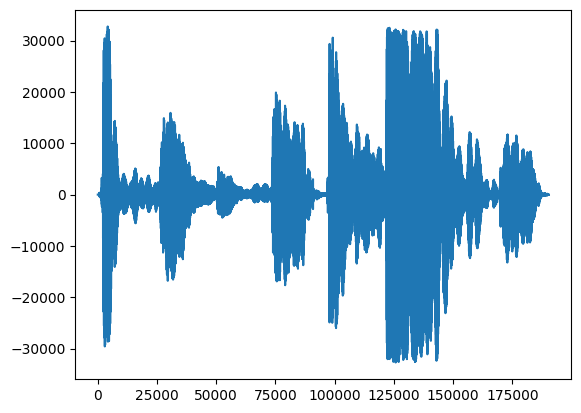
Sebuah visualisasi yang lebih informatif adalah spektogram , yang menunjukkan frekuensi hadir dari waktu ke waktu.
Di sini, kami menggunakan skala frekuensi logaritmik, untuk membuat nyanyian lebih terlihat jelas.
MAX_ABS_INT16 = 32768.0
def plot_stft(x, sample_rate, show_black_and_white=False):
x_stft = np.abs(librosa.stft(x, n_fft=2048))
fig, ax = plt.subplots()
fig.set_size_inches(20, 10)
x_stft_db = librosa.amplitude_to_db(x_stft, ref=np.max)
if(show_black_and_white):
librosadisplay.specshow(data=x_stft_db, y_axis='log',
sr=sample_rate, cmap='gray_r')
else:
librosadisplay.specshow(data=x_stft_db, y_axis='log', sr=sample_rate)
plt.colorbar(format='%+2.0f dB')
plot_stft(audio_samples / MAX_ABS_INT16 , sample_rate=EXPECTED_SAMPLE_RATE)
plt.show()
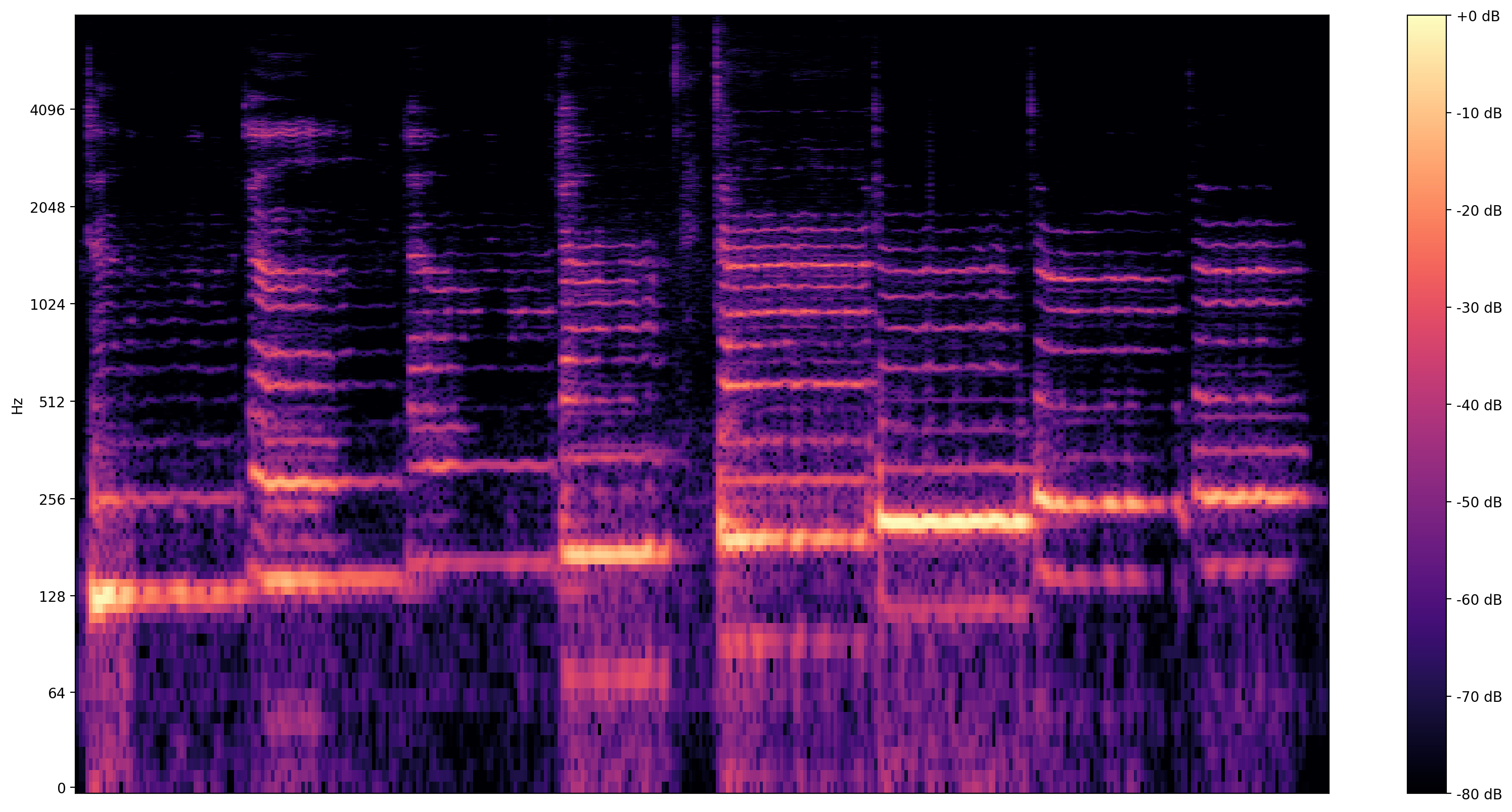
Kami membutuhkan satu konversi terakhir di sini. Sampel audio dalam format int16. Mereka perlu dinormalisasi untuk mengapung antara -1 dan 1.
audio_samples = audio_samples / float(MAX_ABS_INT16)
Menjalankan Model
Sekarang adalah bagian yang mudah, mari kita memuat model dengan TensorFlow Hub, dan pakan audio untuk itu. SPICE akan memberi kita dua keluaran: nada dan ketidakpastian
TensorFlow Hub adalah perpustakaan untuk publikasi, penemuan, dan konsumsi bagian dapat digunakan kembali model pembelajaran mesin. Itu membuat mudah untuk menggunakan pembelajaran mesin untuk memecahkan tantangan Anda.
Untuk memuat model, Anda hanya perlu modul Hub dan URL yang menunjuk ke model:
# Loading the SPICE model is easy:
model = hub.load("https://tfhub.dev/google/spice/2")
WARNING:tensorflow:Unable to create a python object for variable <tf.Variable 'global_step:0' shape=() dtype=int64_ref> because it is a reference variable. It may not be visible to training APIs. If this is a problem, consider rebuilding the SavedModel after running tf.compat.v1.enable_resource_variables(). WARNING:tensorflow:Unable to create a python object for variable <tf.Variable 'global_step:0' shape=() dtype=int64_ref> because it is a reference variable. It may not be visible to training APIs. If this is a problem, consider rebuilding the SavedModel after running tf.compat.v1.enable_resource_variables(). WARNING:tensorflow:Unable to create a python object for variable <tf.Variable 'encoder/conv2d/kernel:0' shape=(1, 3, 1, 64) dtype=float32_ref> because it is a reference variable. It may not be visible to training APIs. If this is a problem, consider rebuilding the SavedModel after running tf.compat.v1.enable_resource_variables(). WARNING:tensorflow:Unable to create a python object for variable <tf.Variable 'encoder/conv2d/kernel:0' shape=(1, 3, 1, 64) dtype=float32_ref> because it is a reference variable. It may not be visible to training APIs. If this is a problem, consider rebuilding the SavedModel after running tf.compat.v1.enable_resource_variables(). WARNING:tensorflow:Unable to create a python object for variable <tf.Variable 'encoder/batch_normalization/gamma:0' shape=(64,) dtype=float32_ref> because it is a reference variable. It may not be visible to training APIs. If this is a problem, consider rebuilding the SavedModel after running tf.compat.v1.enable_resource_variables(). WARNING:tensorflow:Unable to create a python object for variable <tf.Variable 'encoder/batch_normalization/gamma:0' shape=(64,) dtype=float32_ref> because it is a reference variable. It may not be visible to training APIs. If this is a problem, consider rebuilding the SavedModel after running tf.compat.v1.enable_resource_variables(). WARNING:tensorflow:Unable to create a python object for variable <tf.Variable 'encoder/batch_normalization/beta:0' shape=(64,) dtype=float32_ref> because it is a reference variable. It may not be visible to training APIs. If this is a problem, consider rebuilding the SavedModel after running tf.compat.v1.enable_resource_variables(). WARNING:tensorflow:Unable to create a python object for variable <tf.Variable 'encoder/batch_normalization/beta:0' shape=(64,) dtype=float32_ref> because it is a reference variable. It may not be visible to training APIs. If this is a problem, consider rebuilding the SavedModel after running tf.compat.v1.enable_resource_variables(). WARNING:tensorflow:Unable to create a python object for variable <tf.Variable 'encoder/batch_normalization/moving_mean:0' shape=(64,) dtype=float32_ref> because it is a reference variable. It may not be visible to training APIs. If this is a problem, consider rebuilding the SavedModel after running tf.compat.v1.enable_resource_variables(). WARNING:tensorflow:Unable to create a python object for variable <tf.Variable 'encoder/batch_normalization/moving_mean:0' shape=(64,) dtype=float32_ref> because it is a reference variable. It may not be visible to training APIs. If this is a problem, consider rebuilding the SavedModel after running tf.compat.v1.enable_resource_variables(). WARNING:tensorflow:Unable to create a python object for variable <tf.Variable 'global_step:0' shape=() dtype=int64_ref> because it is a reference variable. It may not be visible to training APIs. If this is a problem, consider rebuilding the SavedModel after running tf.compat.v1.enable_resource_variables(). WARNING:tensorflow:Unable to create a python object for variable <tf.Variable 'global_step:0' shape=() dtype=int64_ref> because it is a reference variable. It may not be visible to training APIs. If this is a problem, consider rebuilding the SavedModel after running tf.compat.v1.enable_resource_variables(). WARNING:tensorflow:Unable to create a python object for variable <tf.Variable 'encoder/conv2d/kernel:0' shape=(1, 3, 1, 64) dtype=float32_ref> because it is a reference variable. It may not be visible to training APIs. If this is a problem, consider rebuilding the SavedModel after running tf.compat.v1.enable_resource_variables(). WARNING:tensorflow:Unable to create a python object for variable <tf.Variable 'encoder/conv2d/kernel:0' shape=(1, 3, 1, 64) dtype=float32_ref> because it is a reference variable. It may not be visible to training APIs. If this is a problem, consider rebuilding the SavedModel after running tf.compat.v1.enable_resource_variables(). WARNING:tensorflow:Unable to create a python object for variable <tf.Variable 'encoder/batch_normalization/gamma:0' shape=(64,) dtype=float32_ref> because it is a reference variable. It may not be visible to training APIs. If this is a problem, consider rebuilding the SavedModel after running tf.compat.v1.enable_resource_variables(). WARNING:tensorflow:Unable to create a python object for variable <tf.Variable 'encoder/batch_normalization/gamma:0' shape=(64,) dtype=float32_ref> because it is a reference variable. It may not be visible to training APIs. If this is a problem, consider rebuilding the SavedModel after running tf.compat.v1.enable_resource_variables(). WARNING:tensorflow:Unable to create a python object for variable <tf.Variable 'encoder/batch_normalization/beta:0' shape=(64,) dtype=float32_ref> because it is a reference variable. It may not be visible to training APIs. If this is a problem, consider rebuilding the SavedModel after running tf.compat.v1.enable_resource_variables(). WARNING:tensorflow:Unable to create a python object for variable <tf.Variable 'encoder/batch_normalization/beta:0' shape=(64,) dtype=float32_ref> because it is a reference variable. It may not be visible to training APIs. If this is a problem, consider rebuilding the SavedModel after running tf.compat.v1.enable_resource_variables(). WARNING:tensorflow:Unable to create a python object for variable <tf.Variable 'encoder/batch_normalization/moving_mean:0' shape=(64,) dtype=float32_ref> because it is a reference variable. It may not be visible to training APIs. If this is a problem, consider rebuilding the SavedModel after running tf.compat.v1.enable_resource_variables(). WARNING:tensorflow:Unable to create a python object for variable <tf.Variable 'encoder/batch_normalization/moving_mean:0' shape=(64,) dtype=float32_ref> because it is a reference variable. It may not be visible to training APIs. If this is a problem, consider rebuilding the SavedModel after running tf.compat.v1.enable_resource_variables(). WARNING:tensorflow:Unable to create a python object for variable <tf.Variable 'global_step:0' shape=() dtype=int64_ref> because it is a reference variable. It may not be visible to training APIs. If this is a problem, consider rebuilding the SavedModel after running tf.compat.v1.enable_resource_variables(). WARNING:tensorflow:Unable to create a python object for variable <tf.Variable 'global_step:0' shape=() dtype=int64_ref> because it is a reference variable. It may not be visible to training APIs. If this is a problem, consider rebuilding the SavedModel after running tf.compat.v1.enable_resource_variables(). WARNING:tensorflow:Unable to create a python object for variable <tf.Variable 'encoder/conv2d/kernel:0' shape=(1, 3, 1, 64) dtype=float32_ref> because it is a reference variable. It may not be visible to training APIs. If this is a problem, consider rebuilding the SavedModel after running tf.compat.v1.enable_resource_variables(). WARNING:tensorflow:Unable to create a python object for variable <tf.Variable 'encoder/conv2d/kernel:0' shape=(1, 3, 1, 64) dtype=float32_ref> because it is a reference variable. It may not be visible to training APIs. If this is a problem, consider rebuilding the SavedModel after running tf.compat.v1.enable_resource_variables(). WARNING:tensorflow:Unable to create a python object for variable <tf.Variable 'encoder/batch_normalization/gamma:0' shape=(64,) dtype=float32_ref> because it is a reference variable. It may not be visible to training APIs. If this is a problem, consider rebuilding the SavedModel after running tf.compat.v1.enable_resource_variables(). WARNING:tensorflow:Unable to create a python object for variable <tf.Variable 'encoder/batch_normalization/gamma:0' shape=(64,) dtype=float32_ref> because it is a reference variable. It may not be visible to training APIs. If this is a problem, consider rebuilding the SavedModel after running tf.compat.v1.enable_resource_variables(). WARNING:tensorflow:Unable to create a python object for variable <tf.Variable 'encoder/batch_normalization/beta:0' shape=(64,) dtype=float32_ref> because it is a reference variable. It may not be visible to training APIs. If this is a problem, consider rebuilding the SavedModel after running tf.compat.v1.enable_resource_variables(). WARNING:tensorflow:Unable to create a python object for variable <tf.Variable 'encoder/batch_normalization/beta:0' shape=(64,) dtype=float32_ref> because it is a reference variable. It may not be visible to training APIs. If this is a problem, consider rebuilding the SavedModel after running tf.compat.v1.enable_resource_variables(). WARNING:tensorflow:Unable to create a python object for variable <tf.Variable 'encoder/batch_normalization/moving_mean:0' shape=(64,) dtype=float32_ref> because it is a reference variable. It may not be visible to training APIs. If this is a problem, consider rebuilding the SavedModel after running tf.compat.v1.enable_resource_variables(). WARNING:tensorflow:Unable to create a python object for variable <tf.Variable 'encoder/batch_normalization/moving_mean:0' shape=(64,) dtype=float32_ref> because it is a reference variable. It may not be visible to training APIs. If this is a problem, consider rebuilding the SavedModel after running tf.compat.v1.enable_resource_variables(). WARNING:tensorflow:Unable to create a python object for variable <tf.Variable 'global_step:0' shape=() dtype=int64_ref> because it is a reference variable. It may not be visible to training APIs. If this is a problem, consider rebuilding the SavedModel after running tf.compat.v1.enable_resource_variables(). WARNING:tensorflow:Unable to create a python object for variable <tf.Variable 'global_step:0' shape=() dtype=int64_ref> because it is a reference variable. It may not be visible to training APIs. If this is a problem, consider rebuilding the SavedModel after running tf.compat.v1.enable_resource_variables(). WARNING:tensorflow:Unable to create a python object for variable <tf.Variable 'encoder/conv2d/kernel:0' shape=(1, 3, 1, 64) dtype=float32_ref> because it is a reference variable. It may not be visible to training APIs. If this is a problem, consider rebuilding the SavedModel after running tf.compat.v1.enable_resource_variables(). WARNING:tensorflow:Unable to create a python object for variable <tf.Variable 'encoder/conv2d/kernel:0' shape=(1, 3, 1, 64) dtype=float32_ref> because it is a reference variable. It may not be visible to training APIs. If this is a problem, consider rebuilding the SavedModel after running tf.compat.v1.enable_resource_variables(). WARNING:tensorflow:Unable to create a python object for variable <tf.Variable 'encoder/batch_normalization/gamma:0' shape=(64,) dtype=float32_ref> because it is a reference variable. It may not be visible to training APIs. If this is a problem, consider rebuilding the SavedModel after running tf.compat.v1.enable_resource_variables(). WARNING:tensorflow:Unable to create a python object for variable <tf.Variable 'encoder/batch_normalization/gamma:0' shape=(64,) dtype=float32_ref> because it is a reference variable. It may not be visible to training APIs. If this is a problem, consider rebuilding the SavedModel after running tf.compat.v1.enable_resource_variables(). WARNING:tensorflow:Unable to create a python object for variable <tf.Variable 'encoder/batch_normalization/beta:0' shape=(64,) dtype=float32_ref> because it is a reference variable. It may not be visible to training APIs. If this is a problem, consider rebuilding the SavedModel after running tf.compat.v1.enable_resource_variables(). WARNING:tensorflow:Unable to create a python object for variable <tf.Variable 'encoder/batch_normalization/beta:0' shape=(64,) dtype=float32_ref> because it is a reference variable. It may not be visible to training APIs. If this is a problem, consider rebuilding the SavedModel after running tf.compat.v1.enable_resource_variables(). WARNING:tensorflow:Unable to create a python object for variable <tf.Variable 'encoder/batch_normalization/moving_mean:0' shape=(64,) dtype=float32_ref> because it is a reference variable. It may not be visible to training APIs. If this is a problem, consider rebuilding the SavedModel after running tf.compat.v1.enable_resource_variables(). WARNING:tensorflow:Unable to create a python object for variable <tf.Variable 'encoder/batch_normalization/moving_mean:0' shape=(64,) dtype=float32_ref> because it is a reference variable. It may not be visible to training APIs. If this is a problem, consider rebuilding the SavedModel after running tf.compat.v1.enable_resource_variables().
Dengan model dimuat, data disiapkan, kami membutuhkan 3 baris untuk mendapatkan hasilnya:
# We now feed the audio to the SPICE tf.hub model to obtain pitch and uncertainty outputs as tensors.
model_output = model.signatures["serving_default"](tf.constant(audio_samples, tf.float32))
pitch_outputs = model_output["pitch"]
uncertainty_outputs = model_output["uncertainty"]
# 'Uncertainty' basically means the inverse of confidence.
confidence_outputs = 1.0 - uncertainty_outputs
fig, ax = plt.subplots()
fig.set_size_inches(20, 10)
plt.plot(pitch_outputs, label='pitch')
plt.plot(confidence_outputs, label='confidence')
plt.legend(loc="lower right")
plt.show()
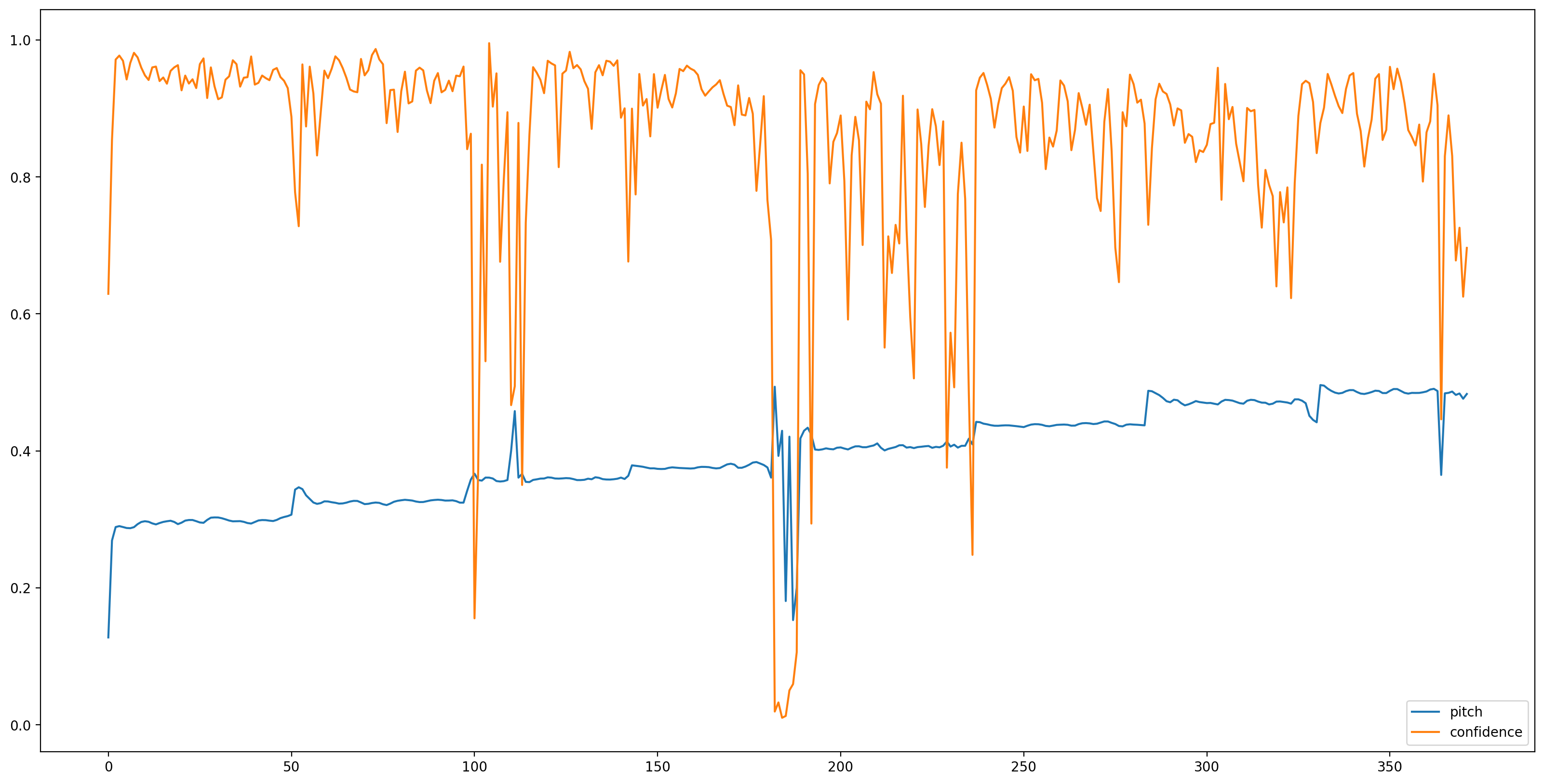
Mari kita buat hasilnya lebih mudah dipahami dengan menghapus semua perkiraan nada dengan keyakinan rendah (keyakinan <0,9) dan plot sisanya.
confidence_outputs = list(confidence_outputs)
pitch_outputs = [ float(x) for x in pitch_outputs]
indices = range(len (pitch_outputs))
confident_pitch_outputs = [ (i,p)
for i, p, c in zip(indices, pitch_outputs, confidence_outputs) if c >= 0.9 ]
confident_pitch_outputs_x, confident_pitch_outputs_y = zip(*confident_pitch_outputs)
fig, ax = plt.subplots()
fig.set_size_inches(20, 10)
ax.set_ylim([0, 1])
plt.scatter(confident_pitch_outputs_x, confident_pitch_outputs_y, )
plt.scatter(confident_pitch_outputs_x, confident_pitch_outputs_y, c="r")
plt.show()
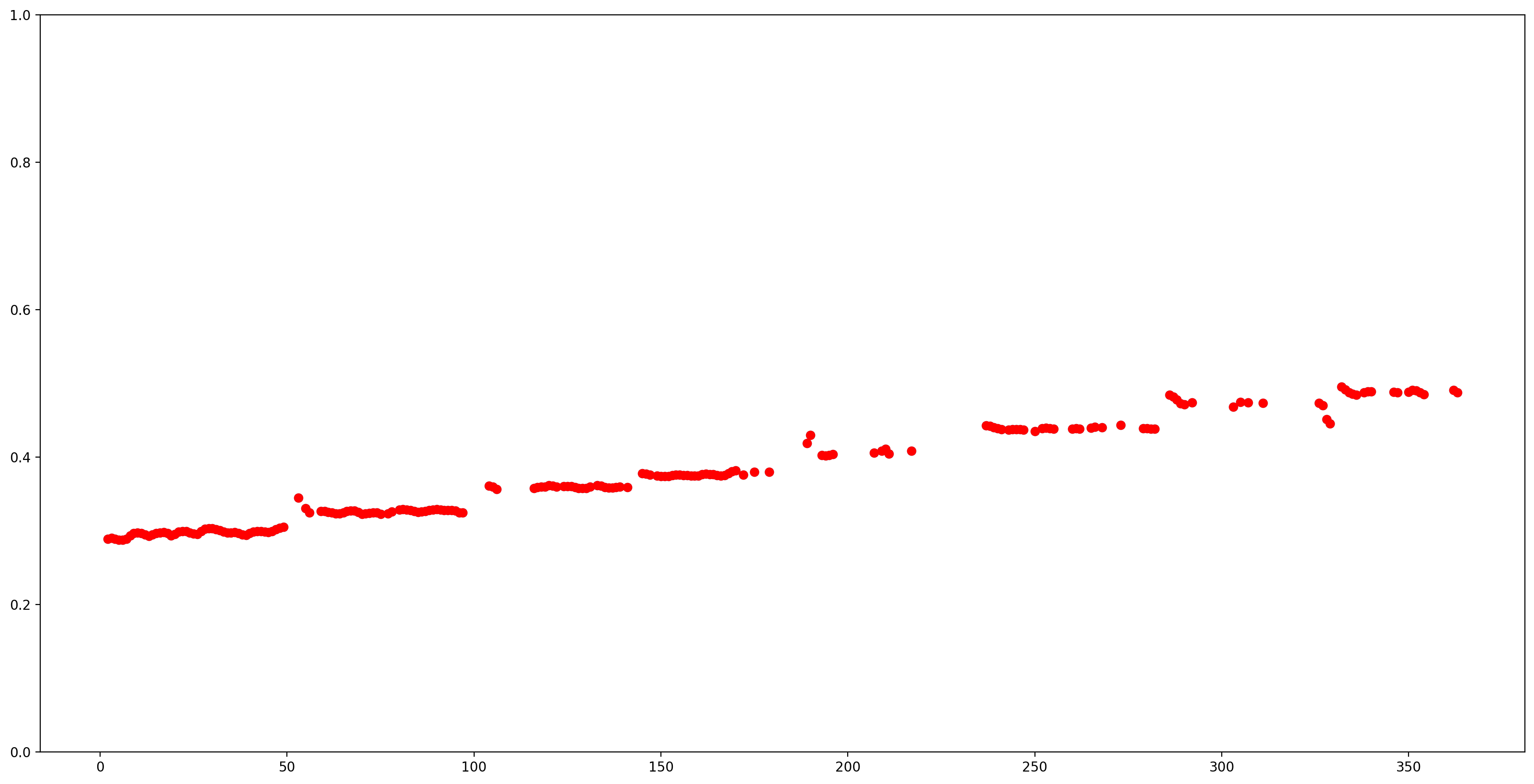
Nilai nada yang dikembalikan oleh SPICE berada dalam kisaran dari 0 hingga 1. Mari kita ubah menjadi nilai nada absolut dalam Hz.
def output2hz(pitch_output):
# Constants taken from https://tfhub.dev/google/spice/2
PT_OFFSET = 25.58
PT_SLOPE = 63.07
FMIN = 10.0;
BINS_PER_OCTAVE = 12.0;
cqt_bin = pitch_output * PT_SLOPE + PT_OFFSET;
return FMIN * 2.0 ** (1.0 * cqt_bin / BINS_PER_OCTAVE)
confident_pitch_values_hz = [ output2hz(p) for p in confident_pitch_outputs_y ]
Sekarang, mari kita lihat seberapa bagus prediksinya: Kami akan melapisi nada yang diprediksi di atas spektogram asli. Untuk membuat prediksi nada lebih terlihat, kami mengubah spektogram menjadi hitam putih.
plot_stft(audio_samples / MAX_ABS_INT16 ,
sample_rate=EXPECTED_SAMPLE_RATE, show_black_and_white=True)
# Note: conveniently, since the plot is in log scale, the pitch outputs
# also get converted to the log scale automatically by matplotlib.
plt.scatter(confident_pitch_outputs_x, confident_pitch_values_hz, c="r")
plt.show()
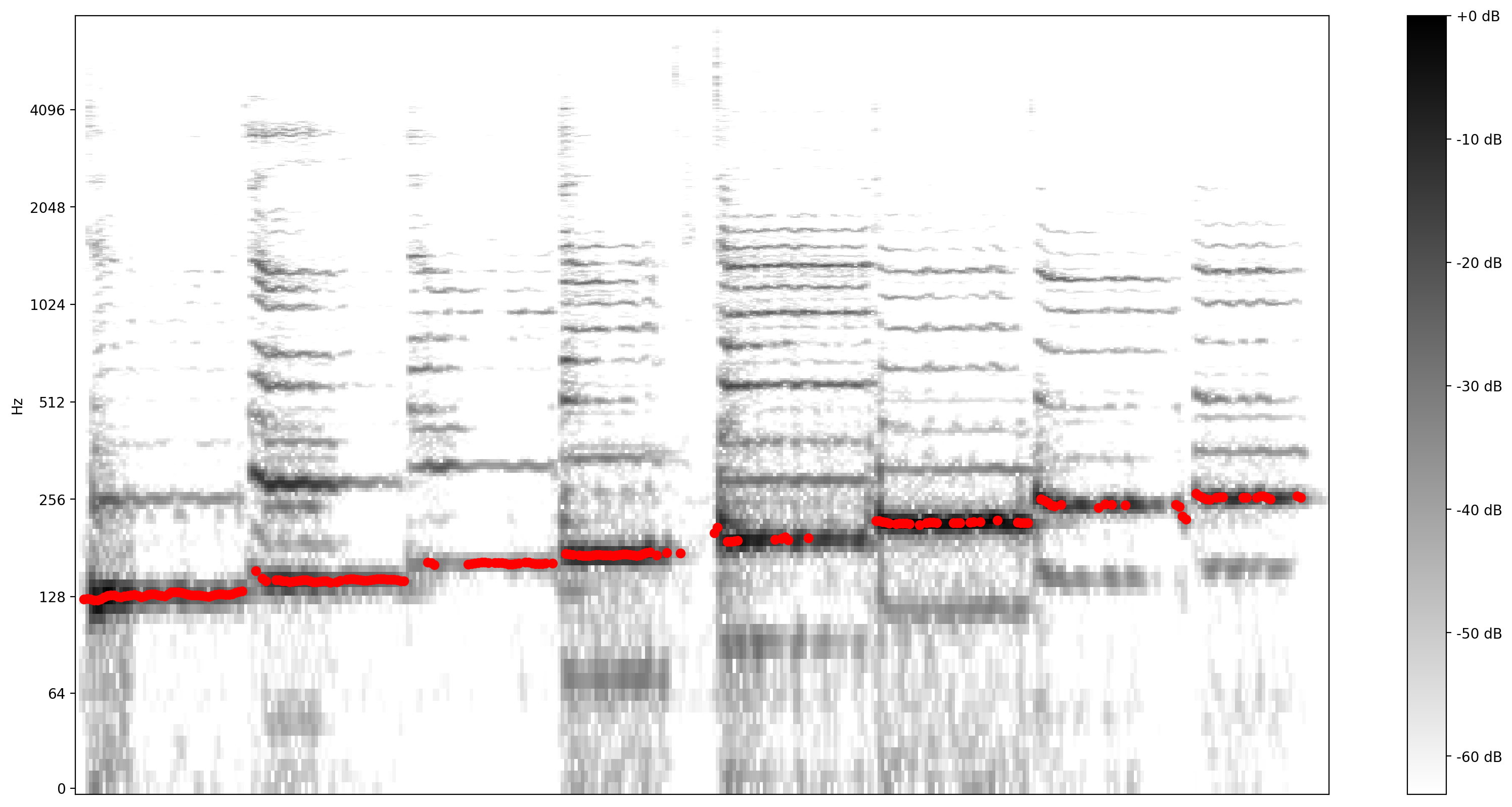
Mengonversi ke not musik
Sekarang setelah kita memiliki nilai nada, mari kita ubah menjadi nada! Ini adalah bagian yang menantang dengan sendirinya. Kita harus memperhatikan dua hal:
- sisanya (bila tidak ada nyanyian)
- ukuran setiap catatan (offset)
1: Menambahkan nol ke output untuk menunjukkan saat tidak ada nyanyian
pitch_outputs_and_rests = [
output2hz(p) if c >= 0.9 else 0
for i, p, c in zip(indices, pitch_outputs, confidence_outputs)
]
2: Menambahkan offset catatan
Ketika seseorang bernyanyi dengan bebas, melodi mungkin memiliki offset ke nilai nada absolut yang dapat diwakili oleh not. Oleh karena itu, untuk mengubah prediksi menjadi catatan, seseorang perlu mengoreksi kemungkinan offset ini. Inilah yang dihitung oleh kode berikut.
A4 = 440
C0 = A4 * pow(2, -4.75)
note_names = ["C", "C#", "D", "D#", "E", "F", "F#", "G", "G#", "A", "A#", "B"]
def hz2offset(freq):
# This measures the quantization error for a single note.
if freq == 0: # Rests always have zero error.
return None
# Quantized note.
h = round(12 * math.log2(freq / C0))
return 12 * math.log2(freq / C0) - h
# The ideal offset is the mean quantization error for all the notes
# (excluding rests):
offsets = [hz2offset(p) for p in pitch_outputs_and_rests if p != 0]
print("offsets: ", offsets)
ideal_offset = statistics.mean(offsets)
print("ideal offset: ", ideal_offset)
offsets: [0.2851075707500712, 0.3700368844097355, 0.2861639241998972, 0.19609005646164235, 0.17851737247163868, 0.27334483073408933, -0.4475316266590852, -0.24651997073237908, -0.1796558047706398, -0.23060136331860548, -0.3782634107643901, -0.4725100625926686, -0.3457194541269999, -0.2436666886383776, -0.1818906877810207, -0.1348077739650435, -0.24551812662426897, -0.4454903457934165, -0.3126792745167535, -0.12241723670307181, -0.06614479972665066, -0.06702634735648871, -0.1744135098034576, -0.29365551425759406, -0.32520890458170726, -0.056438377636119696, 0.1470525135224534, 0.17167006002122775, 0.16529246704037348, 0.09569531546290477, -0.006323616641203955, -0.11799822075907684, -0.18835098459069144, -0.17934754504506145, -0.17215419157092526, -0.23695828034226452, -0.34594501002376177, -0.39380045278613807, -0.2528674895936689, -0.11009248657768467, -0.07118597401920113, -0.08042248799149121, -0.12799598588293293, -0.16227484329287023, -0.05931985421721464, 0.10667800800259641, 0.21044687793906292, 0.2931939382975841, -0.22329278631751492, -0.12365553720538003, -0.4571117360765271, -0.34864566459005175, -0.35947798653189267, -0.4313175396496476, -0.4818928106004421, 0.44220950977261, 0.45883109973128455, -0.47095522924010425, -0.3674495078498552, -0.3047186536962201, -0.31075979246441676, -0.4501382996017185, 0.3966096259778311, 0.4238116671269694, 0.4982676686471237, -0.45932030423227843, -0.4890504510576079, 0.3836871527260044, 0.4441304941600137, -0.38787359430138935, -0.24855899466817277, -0.20666386647764057, -0.23811575664822726, -0.2760223047310504, -0.3641714288169524, -0.41670903606955534, -0.41009272976462086, -0.3340427999073796, -0.26122959716860805, -0.2232610212141708, -0.19940660549943345, -0.22528914465252825, -0.2780899004513415, -0.2744434134537457, -0.25654931231085953, -0.33068201704567457, -0.4678933079416083, -0.4695135511333177, -0.1648153518015647, -0.24618840082233362, -0.48052406086269883, -0.3771743489677135, -0.32261801643912236, -0.25560347987954657, -0.24629741950576545, -0.14035005553309787, -0.16659160448853783, -0.2442749349648139, -0.236978201704666, -0.20882506652418442, -0.22637331529204374, -0.29836135937516417, -0.39081484182421633, -0.3909877680117404, -0.3650093676025108, -0.2642347521955202, -0.13023199393098395, -0.18214744283501716, -0.3020867909366345, -0.33754229827467697, -0.34391801162306024, -0.31454499496763333, -0.26713502510135356, -0.2910439501578139, -0.11686573876684037, -0.1673094354445226, -0.24345334692542053, -0.30852998240535356, -0.35647376789395935, -0.37154654069487236, -0.3600149954730796, -0.2667062802488047, -0.21902000440899627, -0.2484456507736752, -0.2774107871825038, -0.2941432754570741, -0.31118778272216474, -0.32662896348779213, -0.3053947554403962, -0.2160201109821145, -0.17343703730647775, -0.17792559965198507, -0.19880643679444177, -0.2725068260604502, -0.3152120758468442, -0.28217377586905457, -0.11595223738495974, 0.0541902144377957, 0.11488166735824024, -0.2559698195630773, 0.01930235610660702, -0.002236352401425279, 0.4468796487277231, 0.15514959977323883, 0.4207694853966899, 0.3854474319642236, 0.4373497234409598, -0.4694994504625001, -0.3662719146782649, -0.20354085369650932, -0.015043790774988963, -0.4185651697093675, -0.17896653874461066, -0.032896162706066434, -0.061098168330843805, -0.1953772325689087, -0.2545198683315988, -0.3363741032654488, -0.39191536320988973, -0.36531668408458984, -0.3489657612020167, -0.35455202891175475, -0.38925192399566555, 0.48781635300571935, -0.2820884378129733, -0.241939488189864, -0.24987341685836384, -0.3034880535179809, -0.2910712014014081, -0.2783103765422581, -0.30017802073304267, -0.23735882385318519, -0.15802705569807785, -0.1688725350672513, 0.00533368216211727, -0.2545762573057857, -0.28210347487274845, -0.29791870250051034, -0.3228369901949648, -0.3895802937323367, 0.4323827980583488, 0.17439196334535723, -0.12961039467398905, -0.2236296109730489, -0.04022635205333813, -0.4264043621594098, -0.0019025255615048309, -0.07466309859101727, -0.08665327413623203, -0.08169104440753472, -0.31617519541327965, -0.47420548422877573, 0.1502044753855003, 0.30507923857624064, 0.031032583278971515, -0.17852388186996393, -0.3371347884709195, -0.41780861421172233, -0.2023933346444835, -0.10604901297633518, -0.10771248771493447, -0.16037790997569346, -0.18698410763089868, -0.17355977250879562, -0.008242337244190878, -0.011401999431292609, -0.1876701734835322, -0.3601715640598968, 0.011681766969516616, -0.1931417836124183] ideal offset: -0.16889341450193418
Kita sekarang dapat menggunakan beberapa heuristik untuk mencoba dan memperkirakan urutan nada yang paling mungkin dinyanyikan. Offset ideal yang dihitung di atas adalah salah satu bahan - tetapi kita juga perlu mengetahui kecepatan (berapa banyak prediksi yang dibuat, katakanlah, seperdelapan?), dan offset waktu untuk mulai menghitung. Untuk membuatnya tetap sederhana, kami hanya akan mencoba kecepatan dan offset waktu yang berbeda dan mengukur kesalahan kuantisasi, dengan menggunakan nilai yang meminimalkan kesalahan ini.
def quantize_predictions(group, ideal_offset):
# Group values are either 0, or a pitch in Hz.
non_zero_values = [v for v in group if v != 0]
zero_values_count = len(group) - len(non_zero_values)
# Create a rest if 80% is silent, otherwise create a note.
if zero_values_count > 0.8 * len(group):
# Interpret as a rest. Count each dropped note as an error, weighted a bit
# worse than a badly sung note (which would 'cost' 0.5).
return 0.51 * len(non_zero_values), "Rest"
else:
# Interpret as note, estimating as mean of non-rest predictions.
h = round(
statistics.mean([
12 * math.log2(freq / C0) - ideal_offset for freq in non_zero_values
]))
octave = h // 12
n = h % 12
note = note_names[n] + str(octave)
# Quantization error is the total difference from the quantized note.
error = sum([
abs(12 * math.log2(freq / C0) - ideal_offset - h)
for freq in non_zero_values
])
return error, note
def get_quantization_and_error(pitch_outputs_and_rests, predictions_per_eighth,
prediction_start_offset, ideal_offset):
# Apply the start offset - we can just add the offset as rests.
pitch_outputs_and_rests = [0] * prediction_start_offset + \
pitch_outputs_and_rests
# Collect the predictions for each note (or rest).
groups = [
pitch_outputs_and_rests[i:i + predictions_per_eighth]
for i in range(0, len(pitch_outputs_and_rests), predictions_per_eighth)
]
quantization_error = 0
notes_and_rests = []
for group in groups:
error, note_or_rest = quantize_predictions(group, ideal_offset)
quantization_error += error
notes_and_rests.append(note_or_rest)
return quantization_error, notes_and_rests
best_error = float("inf")
best_notes_and_rests = None
best_predictions_per_note = None
for predictions_per_note in range(20, 65, 1):
for prediction_start_offset in range(predictions_per_note):
error, notes_and_rests = get_quantization_and_error(
pitch_outputs_and_rests, predictions_per_note,
prediction_start_offset, ideal_offset)
if error < best_error:
best_error = error
best_notes_and_rests = notes_and_rests
best_predictions_per_note = predictions_per_note
# At this point, best_notes_and_rests contains the best quantization.
# Since we don't need to have rests at the beginning, let's remove these:
while best_notes_and_rests[0] == 'Rest':
best_notes_and_rests = best_notes_and_rests[1:]
# Also remove silence at the end.
while best_notes_and_rests[-1] == 'Rest':
best_notes_and_rests = best_notes_and_rests[:-1]
Sekarang mari kita menulis catatan terkuantisasi sebagai skor lembaran musik!
Untuk melakukannya kami akan menggunakan dua perpustakaan: music21 dan Buka Sheet Music Tampilan
# Creating the sheet music score.
sc = music21.stream.Score()
# Adjust the speed to match the actual singing.
bpm = 60 * 60 / best_predictions_per_note
print ('bpm: ', bpm)
a = music21.tempo.MetronomeMark(number=bpm)
sc.insert(0,a)
for snote in best_notes_and_rests:
d = 'half'
if snote == 'Rest':
sc.append(music21.note.Rest(type=d))
else:
sc.append(music21.note.Note(snote, type=d))
bpm: 78.26086956521739
[Jalankan ini] Fungsi pembantu untuk menggunakan Tampilan Musik Lembaran Terbuka (kode JS) untuk menampilkan skor musik
from IPython.core.display import display, HTML, Javascript
import json, random
def showScore(score):
xml = open(score.write('musicxml')).read()
showMusicXML(xml)
def showMusicXML(xml):
DIV_ID = "OSMD_div"
display(HTML('<div id="'+DIV_ID+'">loading OpenSheetMusicDisplay</div>'))
script = """
var div_id = { {DIV_ID} };
function loadOSMD() {
return new Promise(function(resolve, reject){
if (window.opensheetmusicdisplay) {
return resolve(window.opensheetmusicdisplay)
}
// OSMD script has a 'define' call which conflicts with requirejs
var _define = window.define // save the define object
window.define = undefined // now the loaded script will ignore requirejs
var s = document.createElement( 'script' );
s.setAttribute( 'src', "https://cdn.jsdelivr.net/npm/opensheetmusicdisplay@0.7.6/build/opensheetmusicdisplay.min.js" );
//s.setAttribute( 'src', "/custom/opensheetmusicdisplay.js" );
s.onload=function(){
window.define = _define
resolve(opensheetmusicdisplay);
};
document.body.appendChild( s ); // browser will try to load the new script tag
})
}
loadOSMD().then((OSMD)=>{
window.openSheetMusicDisplay = new OSMD.OpenSheetMusicDisplay(div_id, {
drawingParameters: "compacttight"
});
openSheetMusicDisplay
.load({ {data} })
.then(
function() {
openSheetMusicDisplay.render();
}
);
})
""".replace('{ {DIV_ID} }',DIV_ID).replace('{ {data} }',json.dumps(xml))
display(Javascript(script))
return
# rendering the music score
showScore(sc)
print(best_notes_and_rests)
/tmpfs/src/tf_docs_env/lib/python3.7/site-packages/music21/musicxml/m21ToXml.py:465: MusicXMLWarning: <music21.stream.Score 0x7f276c652190> is not well-formed; see isWellFormedNotation() category=MusicXMLWarning)
<IPython.core.display.Javascript object> ['C3', 'D3', 'E3', 'F3', 'G3', 'A3', 'B3', 'C4']
Mari kita mengkonversi catatan musik ke file MIDI dan mendengarkannya.
Untuk membuat file ini, kita dapat menggunakan aliran yang telah kita buat sebelumnya.
# Saving the recognized musical notes as a MIDI file
converted_audio_file_as_midi = converted_audio_file[:-4] + '.mid'
fp = sc.write('midi', fp=converted_audio_file_as_midi)
wav_from_created_midi = converted_audio_file_as_midi.replace(' ', '_') + "_midioutput.wav"
print(wav_from_created_midi)
converted_audio_file.mid_midioutput.wav
Untuk mendengarkannya di colab, kita perlu mengonversinya kembali ke wav. Cara mudah untuk melakukannya adalah menggunakan Timidity.
timidity $converted_audio_file_as_midi -Ow -o $wav_from_created_midi
Playing converted_audio_file.mid MIDI file: converted_audio_file.mid Format: 1 Tracks: 2 Divisions: 1024 Track name: Playing time: ~16 seconds Notes cut: 0 Notes lost totally: 0
Dan akhirnya, dengarkan audio, yang dibuat dari nada, dibuat melalui MIDI dari nada yang diprediksi, disimpulkan oleh model!
Audio(wav_from_created_midi)
